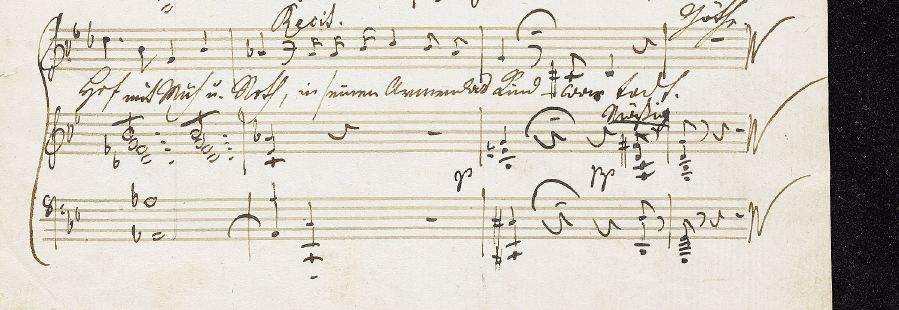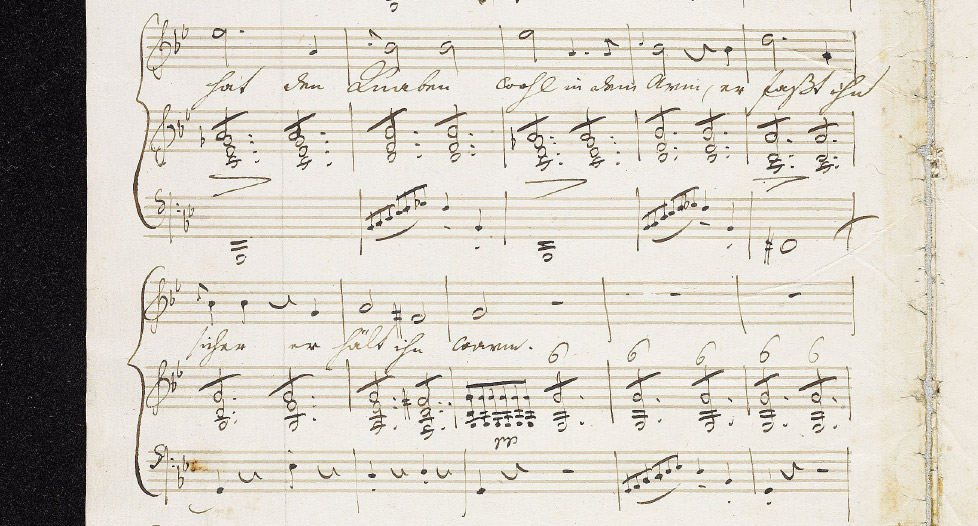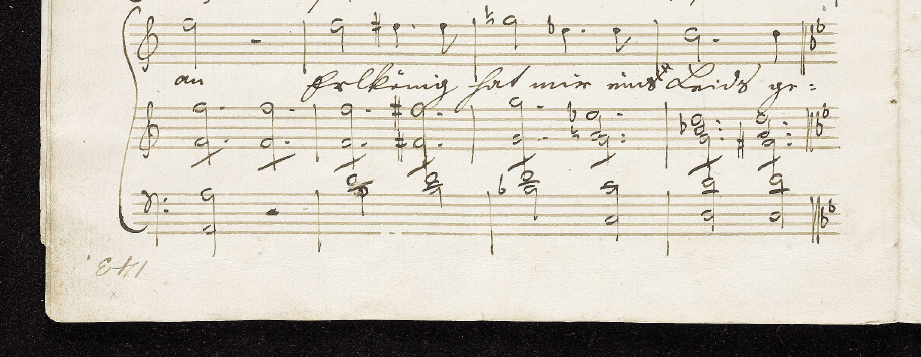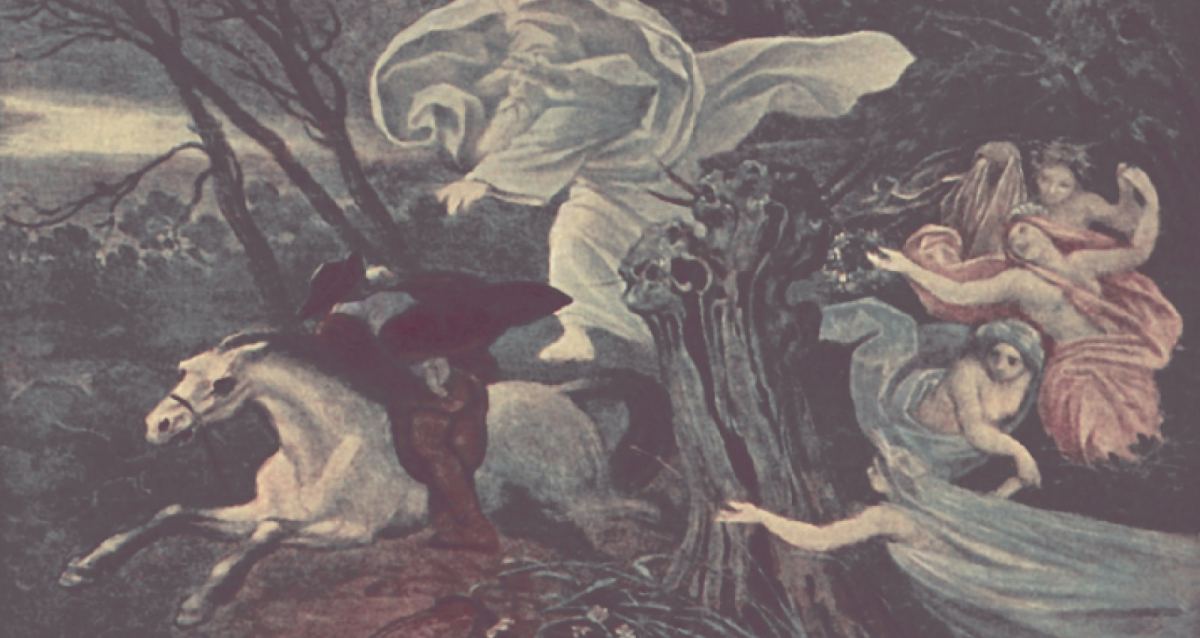Goethe’s “Erlkönig” is one of the most horrifying poems in all of world literature. At its center is an unspeakable tragedy, the death of a child. Also shocking is the language of the poem: it omits any description of the boy’s suffering. The very objectivity of Goethe’s language is chilling.
In Schubert’s setting of “Erlkönig,” he makes a fundamental change to the poem by using music to illustrate the story from the perspective of the dying child. The boy’s emotions—helplessness, fear, desperation, pain—are brought to life in the song and its piano accompaniment. Schubert’s contribution is to add a measure of empathy for the stricken child.
“Erlkönig” is an extremely unusual composition in several ways. There are features that, taken abstractly, would seem to demonstrate a lack of familiarity with the musical conventions of the early 19th century. And while there are many possible poetic interpretations of these moments, they often fall short of explaining why Schubert departed so far from the style of his time.
The accompaniment, with its incessant vibrations, is strange piano writing. The resulting music could be taken as an illustration of the horse’s clopping hooves—at least an abstract illustration, since a horse has (obviously) four legs, not three or six, as the triplet motion would suggest. (The song “Gretchen at the Spinning Wheel,” for example, sounds far more “realistic.”)
In the setting of the line “My son, it’s a wisp of fog,” the dissonance, on the word “son,” is so irregularly composed as to be provocative. A naked major second is resolved upwards (wrong!) to a unison (wrong!!!!). In the musical language of the early 19th century, it was impossible to treat a dissonance more incorrectly.
The ending is unusually abrupt. The boy’s suffering is portrayed vividly in music, but his death itself is not illustrated. There’s a brief phrase, quasi recitativo, a pair of piano chords, and nothing more. The chords are long, not staccato, and there is no fermata.

In Schubert’s time, death was conventionally illustrated by a grand pause in all the instruments. It is extremely unlikely that he wasn’t aware of this—even if he had never explicitly learned the rhetorical device, he would certainly have had enough experience of this convention as listener. A grand pause would have been the obvious choice for this moment, and it’s striking that Schubert didn’t make that choice. The key to the interpretation of the work lies in this decision.
To understand Schubert’s compositional choices, let’s return to the original poem. What is the text really about? There is strong evidence that the poem is describing the rape of a child—from the perspective of the perpetrator.
The latest from VAN, delivered straight to your inbox
Goethe gives the most space in his poem to the emotions of the Erlkönig, who is responsible for the child’s death. The pain of the father, who holds his expiring son in his arms, is also explored thoroughly. Yet the suffering of the child himself seems barely worth mentioning to Goethe. He devotes little space to the boy’s pain, and when he does speak, his words feel strangely artificial—he says, “Erlkönig has done me harm.” This oddly formal phrase sounds hollow coming out of a child’s mouth.
Erlkönig says to the boy, “I love you, I’m charmed by your beautiful form.” [Charmed, in German, is reizen, which can also mean excited or even aroused.] Erlkönig has a crown and a symbolic, phallic tail.
Erlkönig then threatens, “If you’re not willing, I’ll have to use force.” [Force is Gewalt, which can also mean violence, and which forms the center of the word for rape, Vergewaltigung.] This line is abhorrent to our contemporary ears, trained as we are in the inviolability of sexual consent. But it’s worth remembering that this would have sounded different—even routine—in Goethe’s time. Rape within marriage was legal and socially acceptable; the distinction between seducing and forcing someone to do something was far more blurred; weaker groups in society had little recourse to justice. Goethe himself wrote a line saying “I loved boys, but prefer to love girls / If I’ve had my fill of them as girls, I’ll avail myself of them as boys,” without fear of censure. We must assume that these girls, if they were unwilling to be used anally, were taken for this purpose by force.
Schubert’s setting of “Erlkönig” is mostly free, associative. Besides the return of the introductory triplet motive, there are few formal connections or structures to be found. That makes the harmonic and melodic parallels between the lines “He holds him secure, he holds him warm” and “Erlkönig has done me harm” impossible to overlook. The harmonies are exactly the same—they haven’t even been transposed—and only a single chord is left out.


Here, the melodic material that kept the boy secure and warm becomes the cry of the dying—or raped—child. Schubert is telling us who the perpetrator is. The secure, warm touch of the father becomes the suffering he inflicts on his son. And the strange dissonance set to the word “son” takes on a new meaning. Clearly, something is not right. This father-son relationship is distorted, perverted.
There is a sexual image in the accompanying right-hand triplet figure. Imagine the right hand, playing the constant up-and-down vibrations of Schubert’s triplets, taken away from the keyboard and rotated 90 degrees so that the thumb is facing away from the body; now imagine this same motion performed on the penis. It is the motion of masturbation. Here, Schubert pushes his naturalism to its limits. If we assume that the perpetrator was right-handed, which he very likely was (85 percent of people are), then he would have masturbated with his right hand. And the way Schubert builds his song to its climax is analogous to the male orgasm.
The ending is direct and illustrative. Instead of the grand pause that would appropriately depict the child’s death, we get music and words that are analogous to the end of a rape. Excuse the blunt language: in “He reaches the farmhouse with effort and urgency,” the father ejaculates; in “In his arms the child,” he pulls his pants up; and finally, in “was dead,” he zips up his fly, completing the act.
It seems improbable that Schubert used this song to directly process childhood trauma. But it’s obvious that he is, at least unconsciously, reporting from a harrowing experience. In his famous short story “My Dream,” he writes the following:
“…My father took me once again into his favorite garden. He asked me if I liked it. But the garden was wholly repellent to me and I dared not say so. Then, flushing, he asked me a second time: did the garden please me? Trembling, I denied it. Then my father struck me and I fled.” [Translated by Eric Blom/Maynard Solomon.]
Has it occurred to no one that the garden his father was so fond of, that was so abhorrent to little Franz, was the genital region of his father, with an overgrowth of pubic hair? In “My Dream,” a heartrending passage follows the story of the garden. “When I would sing of love, it turned to pain. And again, when I would sing of pain, it turned to love. Thus love and pain divided me,” Schubert wrote. If Schubert did suffer abuse as a child, this would take on an entirely new meaning. Instead of alluding to some diffuse sense of romantic melancholy, it would be a document of the abuse he suffered; and, moreover, of the stunted emotional life to which he was condemned. ¶
Subscribers keep VAN running!
VAN is proud to be an independent classical music magazine thanks to our subscribers. For just over 10 cents a day, you can enjoy unlimited access to over 875 articles in our archives—and get new ones delivered straight to your inbox each week.
Not ready to commit to a full year?
You can test-drive VAN for one month for the price of a coffee.


Comments are closed.